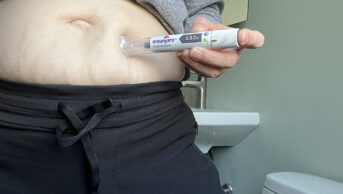
STEVE HORRELL / SCIENCE PHOTO LIBRARY
Six leading UK health bodies have published a joint safety alert in response to concerns about requests from private clinics to prescribe high doses of oestrogen, outside of product licence, sometimes with insufficient progestogen, for women experiencing symptoms of the menopause.
The alert — issued on 3 April 2023 by the British Menopause Society (BMS), Faculty of Sexual and Reproductive Healthcare (FSRH), Royal College of General Practitioners (RCGP), Royal College of Obstetricians and Gynaecologists (RCOG), Society for Endocrinology, and the Royal College of Nursing (RCN) Women’s Heath Forum — said they were aware of “increasing numbers” of women being initiated on high doses of oestrogen which, they said, was “not in line with any clinical guideline”.
“Oestrogen should not be regularly prescribed in doses higher than the upper limit listed in the individual summary of product characteristics, as these limits are informed by the results of clinical trials, to ensure patient safety,” the statement said.
“If, in exceptional circumstances, a higher than licensed dose is deemed necessary for symptom control, informed consent should be obtained according to good medical practice guidance and patients must be made aware that treatment falls outside of reassuring safety evidence.
“In addition, the dose of progestogen should be increased proportionately.”
The alert also referred to guidance set out by the National Institute for Health and Care Excellence, the Medicines and Healthcare products Regulatory Agency, as well as national and international guidance.
“The guidance is to aim for the lowest effective dose to control symptoms,” it added.
In December 2022, The Pharmaceutical Journal exclusively reported that some patients attending private menopause clinics were being prescribed oestrogen at up to double the recommended dose.
Also, in some cases, patients were not being prescribed a sufficient dose of progesterone to adequately protect the womb lining, which can lead to an increased risk of some types of cancer.
At the time, the BMS said it was “very much aware” of the issues surrounding “unorthodox prescribing” by private providers and was working with other specialist societies and colleges to address the matter “as a priority”.
“The joint BMS, FSRH, RCGP, RCOG, Society for Endocrinology and RCN Women’s Health Forum patient safety alert was developed in response to many queries from GPs and allied primary health care clinicians,” explained Paula Briggs, a consultant in sexual and reproductive health at Liverpool Women’s NHS Foundation Trust and chair of the BMS.
“They raised concerns in relation to requests from private clinics (Newson Health) to prescribe high doses of oestrogen, outside of product license, sometimes with insufficient progestogen to ensure endometrial protection,” she added.
“These organisations are aligned in their opinion regarding menopause management, within existing clinical guidelines for most women. These guidelines were developed to ensure patient safety.”
The concerns over prescribing at private clinics comes amid rising awareness of the symptoms of the menopause, with the number of HRT products prescribed in England increasing by a third in one year, and shortages of products ongoing since 2018.

